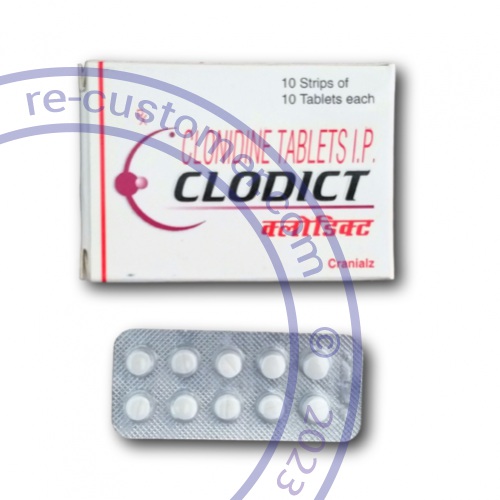
Enfermedades Cardiovasculares, Presión Arterial
Marca(s): Clodict / Arkamin
Fabricante: Consern Pharma Private Limited / Unichem Laboratories
Diseases: Hypertension / ADHD
| Empaquetado | Precio | Per comprimido | Ahorro | Order |
|---|---|---|---|---|
| 100mcg × 180 Comprimidos | € 63.96 | € 0.36 | € 159.78 | Añadir a la cesta |
| 100mcg × 90 Comprimidos | € 57.73 | € 0.64 | € 54.13 | Añadir a la cesta |
| 100mcg × 60 Comprimidos | € 48.85 | € 0.81 | € 25.73 | Añadir a la cesta |
| 100mcg × 30 Comprimidos | € 37.29 | € 1.24 | Añadir a la cesta |
Clonidine tablets
What is clonidine?
Clonidine lowers blood pressure by decreasing the levels of certain chemicals in your blood. This allows your blood vessels to relax and your heart to beat more slowly and easily.
The Catapres brand of clonidine is used to treat hypertension (high blood pressure). The Kapvay brand is used to treat attention deficit hyperactivity disorder (ADHD).
Clonidine is sometimes given with other medications.
Important information
Before you take clonidine, tell your doctor if you have heart disease or severe coronary artery disease, a heart rhythm disorder, slow heartbeats, low blood pressure, a history of heart attack or stroke, kidney disease, or if you have ever had an allergic reaction to a Catapres TTS transdermal skin patch.
Before taking this medicine
You should not take this medicine if you are allergic to clonidine.
To make sure clonidine is safe for you, tell your doctor if you have:
-
heart disease or severe coronary artery disease;
-
heart rhythm disorder, slow heartbeats;
-
low blood pressure, or a history of fainting spells;
-
a history of heart attack or stroke;
-
pheochromocytoma (tumor of the adrenal gland);
-
kidney disease; or
-
if you have ever had an allergic reaction to a Catapres TTS skin patch.
Older adults may be more sensitive to the effects of this medicine.
It is not known whether this medicine will harm an unborn baby. Tell your doctor if you are pregnant or plan to become pregnant while taking clonidine.
Clonidine can pass into breast milk and may harm a nursing baby. Tell your doctor if you are breast-feeding a baby.
Catapres is not approved for use by anyone younger than 18 years old. Do not give Kapvay to a child younger than 6 years old.
How should I take clonidine?
Take clonidine exactly as it was prescribed for you. Follow all directions on your prescription label. Your doctor may occasionally change your dose to make sure you get the best results. Do not take this medicine in larger or smaller amounts or for longer than recommended.
Clonidine is usually taken in the morning and at bedtime. If you take different doses of this medicine at each dosing time, it may be best to take the larger dose at bedtime.
Clonidine may be taken with or without food.
Do not use two forms of clonidine at the same time. This medicine is also available as a transdermal patch worn on the skin.
Do not crush, chew, or break an extended-release tablet. Swallow it whole. Tell your doctor if you have trouble swallowing the tablet.
If you need surgery, tell the surgeon ahead of time that you are using clonidine. You may need to stop using the medicine for a short time.
Do not stop using clonidine suddenly, or you could have unpleasant withdrawal symptoms. Ask your doctor how to safely stop using this medicine.
Call your doctor if you are sick with vomiting. Prolonged illness can make it harder for your body to absorb this medicine, which may lead to withdrawal symptoms. This is especially important for a child taking clonidine.
If you are being treated for high blood pressure, keep using this medication even if you feel well. High blood pressure often has no symptoms. You may need to use blood pressure medication for the rest of your life.
Store at room temperature away from moisture, heat, and light.
What happens if I miss a dose?
Take the missed dose as soon as you remember. Skip the missed dose if it is almost time for your next scheduled dose. Do not take extra medicine to make up the missed dose.
What happens if I overdose?
Overdose symptoms may include dangerously high blood pressure (severe headache, pounding in your neck or ears, nosebleed, anxiety, chest pain, shortness of breath) followed by low blood pressure (feeling like you might pass out). Other overdose symptoms may include feeling cold, extreme weakness or drowsiness, weak or shallow breathing, pinpoint pupils, fainting, or seizure (convulsions).
What should I avoid while taking clonidine?
Avoid drinking alcohol. It may increase certain side effects of clonidine.
Clonidine may impair your thinking or reactions. Avoid driving or operating machinery until you know how this medicine will affect you. Dizziness or severe drowsiness can cause falls or other accidents.
Clonidine side effects
Get emergency medical help if you have signs of an allergic reaction to clonidine: hives; difficult breathing; swelling of your face, lips, tongue, or throat.
Call your doctor at once if you have:
-
severe chest pain, shortness of breath, irregular heartbeats;
-
a very slow heart rate;
-
severe headache, pounding in your neck or ears, blurred vision;
-
nosebleeds;
-
anxiety, confusion; or
-
a light-headed feeling, like you might pass out.
Serious side effects may be more likely in older adults.
Common clonidine side effects may include:
-
drowsiness, dizziness;
-
feeling tired or irritable;
-
dry mouth, loss of appetite;
-
constipation;
-
dry eyes, contact lens discomfort; or
-
sleep problems (insomnia), nightmares.
This is not a complete list of side effects and others may occur.
What other drugs will affect clonidine?
Taking this medicine with other drugs that make you sleepy can worsen this effect. Ask your doctor before taking clonidine with a sleeping pill, narcotic pain medicine, muscle relaxer, or medicine for anxiety, depression, or seizures.
Tell your doctor about all your current medicines and any you start or stop using, especially:
-
other heart or blood pressure medications;
-
an antidepressant; or
-
any other medicine that contains clonidine.
This list is not complete. Other drugs may interact with clonidine, including prescription and over-the-counter medicines, vitamins, and herbal products. Not all possible interactions are listed in this medication guide.

Cómo puedo ayudarle?



